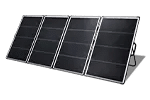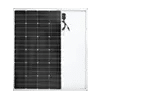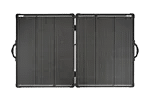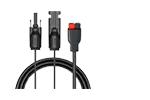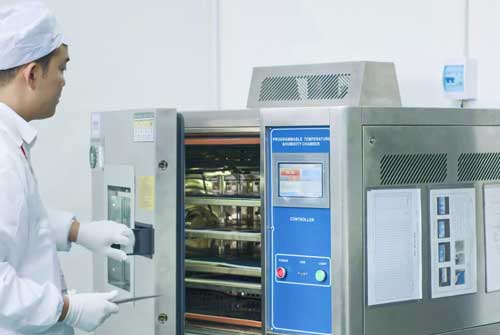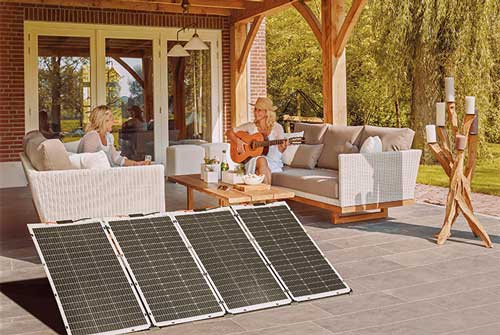As the world continues to shift towards renewable energy sources, solar panels have become a popular option for homeowners and businesses alike. Not only do they help reduce carbon emissions and save on energy costs, but they can also increase the value of a property. However, with so many options on the market, it can be overwhelming to choose the right solar panel for your needs. In this article, we will discuss the factors to consider before making your purchase.
Table of Contents
I. Understanding the Basics of Solar Panels
-
- How do Solar Panels Work?
- Types of Solar Panels
II.Factors to Consider When Buying Solar Panels
-
-
- Efficiency
- Wattage
- Durability and Warranty
- Size and Space Requirements
- Installation and Maintenance Costs
- Brand Reputation and Customer Reviews
-
III. Financing and Incentives
-
-
-
- Government Rebates and Tax Credits
- Leasing VS. Buying
- Financing Options
-
-
IV. Choosing a Solar Panel Installer
-
-
-
-
- Accreditation and Licensing
- Experience and Expertise
- Price and Contract Terms
-
-
-
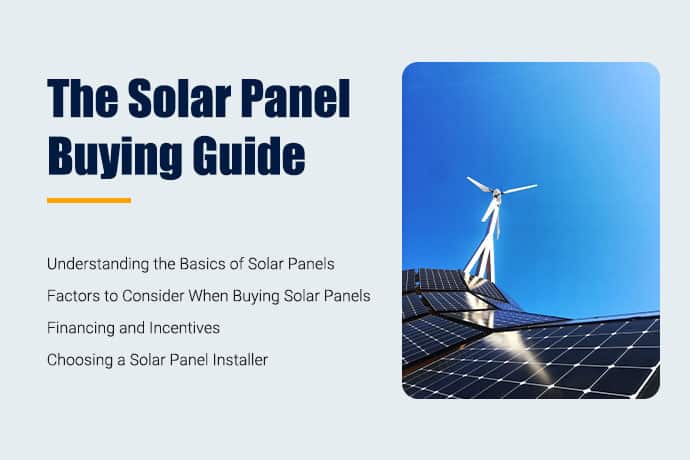
Understanding the Basics of Solar Panels
Solar panels are made up of photovoltaic cells that convert sunlight into direct current (DC) electricity. This electricity is then converted into alternating current (AC) electricity through an inverter, which can be used to power homes or businesses. The amount of energy generated depends on the size and efficiency of the solar panel.
- Types of Solar Panels
There are three main types of solar panels: monocrystalline, polycrystalline, and thin film. Monocrystalline panels are the most efficient and expensive, while polycrystalline panels are less expensive but slightly less efficient. Thin-film panels are the least expensive but also the least efficient.
| Type of Panel | Material | Efficiency | Cost |
|---|---|---|---|
| Monocrystalline | Single high-purity silicon crystal | Around 22% | Most expensive |
| Polycrystalline | Multiple small silicon crystals | Around 15-18% | Less expensive than monocrystalline |
| Thin-film | Photovoltaic material deposited on the substrate | Around 10-12% | Least expensive |
Factors to Consider When Buying Solar Panels
- Efficiency
Solar panel efficiency refers to the amount of sunlight that is converted into electricity. The higher the efficiency, the more electricity a solar panel can generate. While more efficient panels may be more expensive, they can also provide greater long-term savings.
- Wattage
Wattage refers to the amount of power that a solar panel can produce. The higher the wattage, the more electricity a panel can generate. When choosing a solar panel, it is important to consider your energy needs and the amount of space available for installation.
- Durability and Warranty
Solar panels are designed to withstand harsh weather conditions, but some panels may be more durable than others. It is important to choose a panel with a strong warranty that covers any potential damage or defects.
- Size and Space Requirements
Solar panels come in different sizes and require a certain amount of space for installation. It is important to consider the available space on your property and choose a panel that fits your needs.
- Installation and Maintenance Costs
Installation and maintenance costs can vary depending on the size and complexity of the installation. It is important to factor in these costs when considering the overall investment in purchasing solar panels.
- Brand Reputation and Customer Reviews
When choosing a solar panel, it is important to research the brand reputation and customer reviews. Look for companies with a proven track record of quality and customer satisfaction.
Financing and Incentives
- Government Rebates and Tax Credits
Many governments offer rebates and tax credits for homeowners and businesses that install solar panels. It is important to research the available incentives in your area and factor them into your purchasing decision.
- Leasing VS. Buying
Some companies offer the option to lease solar panels rather than buy them outright. While leasing may provide lower upfront costs, while leasing may provide lower upfront costs, it may not be the most cost-effective option in the long run. Buying solar panels outright may result in greater long-term savings and investment returns.
- Financing Options
There are also financing options available for those who may not be able to pay for solar panels upfront. Many companies offer financing plans with low-interest rates that allow homeowners and businesses to pay for their solar panels over time.
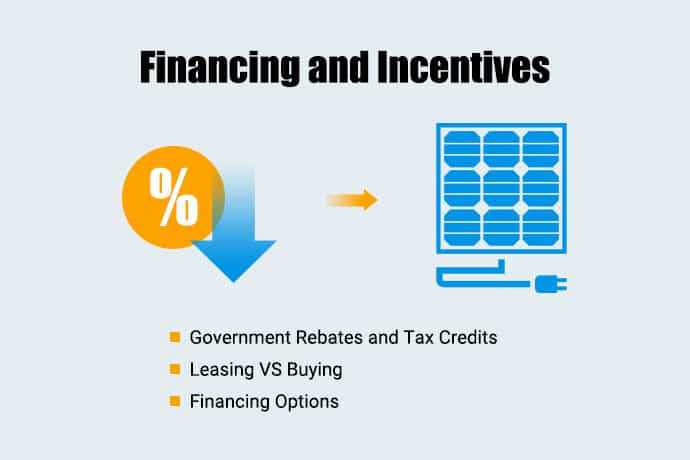
Choosing a Solar Panel Installer
- Accreditation and Licensing
It is important to choose a solar panel installer who is accredited and licensed in your area. Accreditation and licensing ensure that the installer is qualified and adheres to safety standards.
- Experience and Expertise
Choosing an experienced and knowledgeable installer can ensure that your solar panels are installed correctly and efficiently. Look for installers with a proven track record of successful installations.
- Price and Contract Terms
When choosing an installer, it is important to consider the overall price and contract terms. Look for installers who provide transparent pricing and clear contract terms.
Conclusion
Investing in solar panels can provide long-term savings, reduce carbon emissions, and increase property value. However, it is important to consider various factors before making a purchase. Factors such as efficiency, wattage, durability and warranty, size and space requirements, installation and maintenance costs, brand reputation, and customer reviews should all be taken into account. Additionally, researching available financing and incentives, and choosing an accredited and experienced installer can ensure a successful and cost-effective investment in solar energy.



